All posts by Jason Cooper
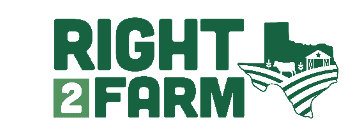
Return to July 2023 Dairy Dispatch
On the November ballot: Right to Farm
Rep. DeWayne Burns asks Texas dairy community for support
By State Rep. DeWayne Burns
Chair, Texas House Committee on Land and Resource Management
The dairy farming community has enjoyed a symbiotic relationship with the people of Texas which has allowed dairy farmers to continue producing wholesome dairy products for our state and beyond.
During this legislative session, I am proud to have championed historic legislation and a constitutional amendment aimed at protecting the interests of dairy farmers from burdensome regulations imposed by local governments. This action became necessary as some municipalities started implementing ordinances and zoning restrictions that limited or outright prohibited the use of land for ag production.
While the legislation I fought for will provide statutory protections for the agricultural use of land, we now have a golden opportunity to solidify these safeguards in the Texas Constitution. By doing so, we can more effectively defend the right to farm and ranch, particularly as our state continues to experience unprecedented urban growth, and the continued loss of knowledge and appreciation for what it takes to get a gallon of milk from the farm to the grocery shelves and ultimately on Texans’ tables. Significantly, the Texas House and Senate passed the constitutional amendment proposal unanimously, conveying expansive support from lawmakers across the state.
Our success in securing constitutional protection hinges on the upcoming ballot in November. It is imperative that we educate Texans on this important measure ahead of the election.
Additionally, we’ve witnessed similar constitutional amendments facing formidable opposition in other states, such as Missouri and Oklahoma. Missouri’s amendment passed by a mere 3,000 votes, while Oklahoma’s amendment suffered a resounding defeat. Therefore, we have set up a political action committee to raise the money necessary to be successful. For those of you that have already contributed to our efforts, thank you, your contribution to the RIGHT2FARM PAC will significantly aid our efforts. If you have not yet contributed, or would like to contribute more, please visit www.Right2FarmTexas.com for more information. Together, let’s protect the right to farm and ensure a thriving future for our state’s dairy industry.
Return to July 2023 Dairy Dispatch
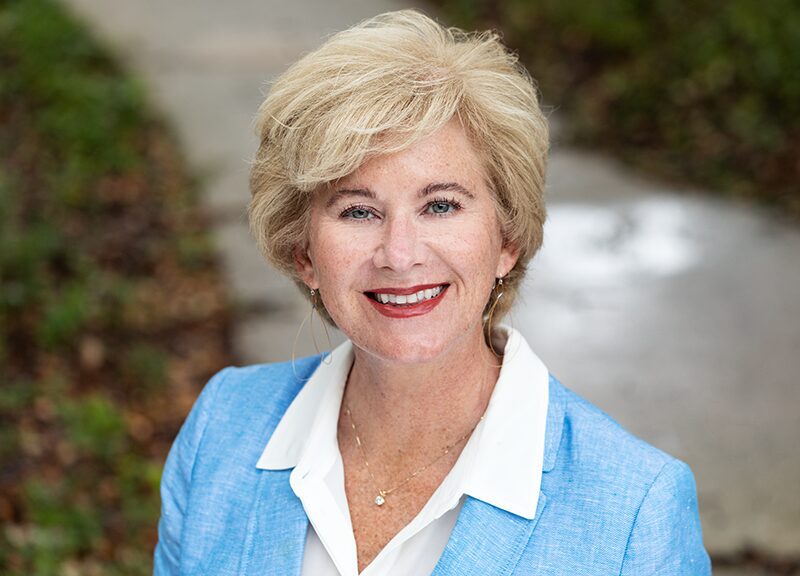
Return to July 2023 Dairy Dispatch
Beef + Dairy: Better Together
By Molly McAdams, Executive Vice President, Texas Beef Council
All agriculturalists, despite sector and other factors that set us apart, need to stick together. We all face what may be our greatest threat, which is a lack of understanding of how food is produced.
Farm and ranch families make up less than 2% of the U.S. population (USDA) and are responsible for feeding the masses that are three to four generations removed from our way of life. Beef and dairy industries both face the challenge of protecting our reputations as contributors to sustainable food systems while also sharing the facts about our products in a way that resonates with today’s consumer.
Drawing a clear connection between beef and dairy has been a focus during my relatively short tenure with the Texas Beef Council. The synergies are easy to spot when you look at the impact we’re all making across research, promotion and education. Through checkoff dollars, our industries have been dedicated to pursuing science-based research to affect nutrition guidance for all Americans. We both focus on the value of beef and milk delivering nutritional goodness with a single ingredient and minimal processing. We’re also working to tell the story of how cattle turn natural resources into high-quality proteins, whether it be beef, dairy or beef on dairy that has been so important to the supply of high-quality beef during drought periods. Many more examples exist.
Last year I attended Southwest Dairy Day and toured a robotic dairy. It was remarkable to observe the industry’s commitment to innovation. I’ve held jobs in meat packing plants, food manufacturing and retail, and I love to see solutions that produce great products more efficiently. Animal care was on display through so many elements like the bedding, fans and back scratchers. I was in awe of the thoughtfulness that also delivered efficient production of a critical food in our diet.
Dairy has led the way in innovation, and I’m optimistic for the future as our industries continue seeking collective solutions like beef on dairy. I’m also thankful for leadership from the two dairy representatives on our board: Mark Sustaire and Klazina de Boer. They are passionate, engaged and enthusiastic to represent each of you as dairy producers.
A priority of mine moving forward is to uncover more ways beef and dairy can partner to drive toward our collective goal of building consumer confidence. Many of our most popular beef recipes on BeefLovingTexans.com contain cheese, for example. Both dairy and beef have outreach programs working with medical offices to educate physicians and combat misinformation about how our foods are raised. We also are both heavily involved in sports nutrition and the importance of beef and dairy products in performance and recovery.
My personal commitment is to grow closer to the dairy industry through relationships and finding more ways for Texas Beef Council to collaborate with dairy checkoff programs. We have remarkable opportunities to combine efforts to be greater than the sum of our parts. We can learn from each other through our work to reach more consumers with fact-based information about our foods and where they come from.
88 Texas Legislative Report – Sine Die
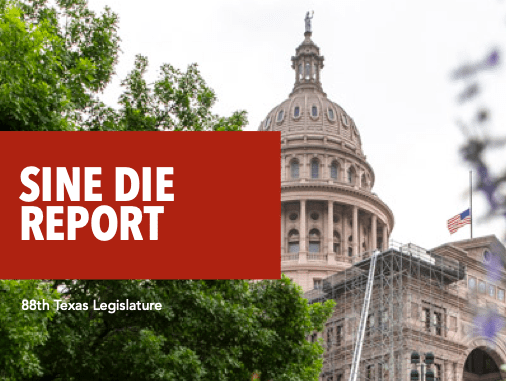
Return to June 2023 newsletter
Find our comprehensive Sine Die Report here.
Note: Content below was posted and current as of June 19, 2023
Around the Texas Capitol:
What did lawmakers accomplish during the regular session?
By Lauren Fairbanks and J Pete Laney
TAD Governmental Affairs
Finally, 140 days of calm, chaos and, ultimately, resolution are behind us for the most part. The Regular Session of the 88th Texas Legislature adjourned Sine Die on Monday, May 29. Just hours later, Gov. Greg Abbott called the Legislature back into a special session to consider border security and property tax relief measures. As of this writing, neither issue has been resolved, and the governor has promised future special sessions.
Meanwhile, let’s recap the regular session.
The House and Senate combined filed 8,345 bills and resolutions this session. Of those bills, only 1,245 were passed and sent to Abbott for consideration. June 18 was the last day for Abbott to act on legislation, and he vetoed 76 bills, the second highest total in state history.
Here’s how two bills of particular interest to the Texas dairy industry fared:
Milk Disposal. HB 692 by Rep. Glenn Rogers (R-Graford)/Sen. Drew Springer (R-Muenster), relating to the authorization for certain land applications and disposal of dairy waste, would allow for the safe disposal of milk and milk by-products by land applications and proper disposal in retention facilities as long as those applications protect water quality. It has been signed by the governor and is effective Sept. 1. The focus now shifts to the Texas Commission on Environmental Quality for its rulemaking.
Bosque Watershed CAFO Permitting. HB 2827 by Rep. DeWayne Burns (R-Cleburne), relating to the permitting of and performance of annual soil tests for certain concentrated animal feeding operations by the Texas Commission on Environmental Quality, would have streamlined permitting for dairy farmers located within the North Bosque River Watershed by allowing general permits rather than the overly burdensome individual permits they are currently required to obtain. Unfortunately, the bill ultimately died in the Senate where it was never given a committee hearing.
Find our comprehensive Sine Die Report here.
The inauguration of Abbott and Lt. Gov Dan Patrick on Jan. 17 seems like a lifetime ago. While the Legislature was slow to get down to business, the drama and political theater started early and was a near constant throughout. News headlines spanned from an alleged driving while intoxicated offense of a prominent state senator to the expulsion of a state representative for inappropriate conduct to the impeachment of Attorney General Ken Paxton by the Texas House. Expect more drama during special sessions and as the Texas Senate considers whether Paxton should be permanently removed from his post.
In spite of the onslaught of breaking news that kept the Capitol Press Corps on its toes, the Legislature did ultimately push a wide range of leadership priorities across the finish line, including the biennial state budget, electricity market reforms, border security funding, school safety provisions, local preemption and massive investments in the state’s infrastructure.
Unfortunately, some priority measures remain unfulfilled and will be addressed in special session(s). And when Legislature comes back for one or two issues, the list tends to grow, especially when those setting the agenda might be eying a run for higher office.
It’s not over yet …
Return to June 2023 newsletter
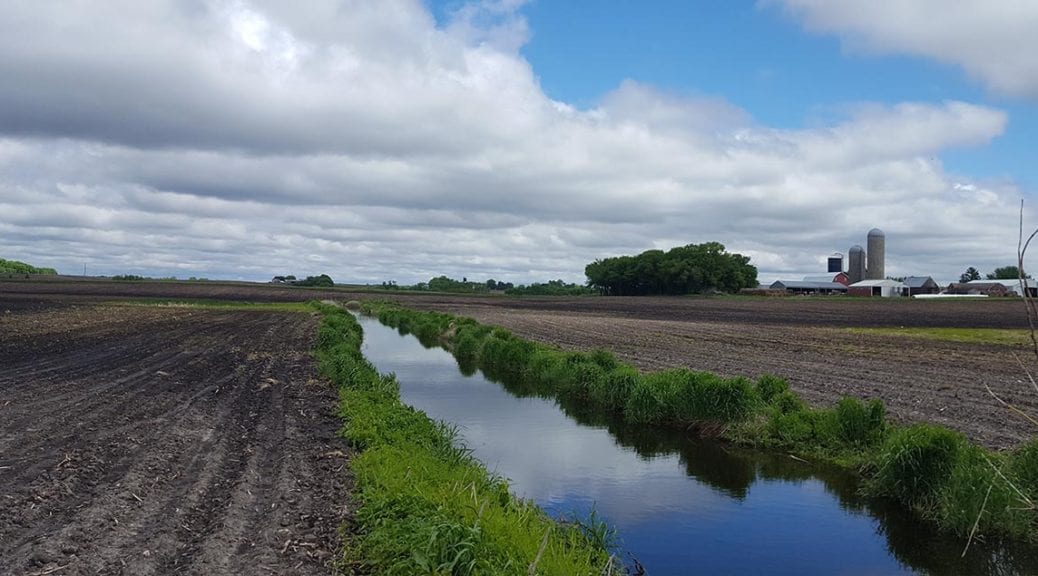
Return to June 2023 newsletter
WOTUS Changes Continue: U.S. Supreme Court overturns “significant nexus” test in Sackett v. EPA
By Jim Bradbury and Courtney Cox Smith
James D. Bradbury, PLLC
In the ongoing saga of defining and redefining the definition and regulation of Waters of the United States (WOTUS) under the Clean Water Act (CWA), the U.S. Supreme Court made waves once again when it unanimously held on May 25 in Sackett v. EPA that the “significant nexus” test is not the proper way to determine whether the CWA applies to a particular wetland.
In its place, the Court clarified that the correct test is whether the wetland has “a continuous surface connection to bodies that are ‘waters of the United States’ in their own right, so that they are ‘indistinguishable’ from those waters.” This decision will undoubtedly have significant impacts on WOTUS determinations, particularly under the final rule issued by the Biden Administration that embraced three legal standards for determining WOTUS, including the significant nexus test.
To recap, under the recent Biden WOTUS Rule, for water bodies that pose a question as to whether they are jurisdictional, the agencies look to three standards: the relatively permanent standard, the significant nexus standard and the material influence standard. The “relatively permanent standard” means “waters that are relatively permanent, standing or continuously flowing and waters with a continuous surface connection to such waters.” The “significant nexus standard” is defined as “waters that either alone or in combination with similarly situated waters in the region, significantly affect the chemical, physical, or biological integrity of traditional navigable waters, interstate waters, or the territorial seas.” A third new alternative legal standard is also in the final rule: the “material influence” standard. Under this standard, a smaller water body must have a “material influence” on a larger water body for the smaller water or wetland to be within the jurisdiction of the Clean Water Act.
Regulators could rely on any one of the three tests, meaning that a landowner who wants to avoid a finding of jurisdiction will need to disprove all three tests – a heavy burden to overcome.
Now the Supreme Court has overturned the significant nexus standard in the context of wetlands. Questions remain, however, as the Court did not define the correct test to be applied to other types of waterbodies such as tributaries.
What does the decision mean for the Biden Rule, and more importantly, what does it mean for agriculture? The full impacts are yet unknown for the Biden Rule, but at a minimum, the Biden Rule will have to be revisited to address the Court’s ruling in Sackett and its impact to the significant nexus analysis.
For agriculture, the ruling is a step in the right direction for farmers and ranchers as it narrows what wetlands can be subject to CWA jurisdiction. Moreover, the new “continuous surface connection” the Court provided in Sackett creates a more straightforward rule to understand and apply in determining whether a wetland is covered by the CWA. Namely, under the Court’s new standard, the question is whether the wetland physically touches another jurisdictional water.
Ultimately, the WOTUS saga is far from over. The standards continue to evolve, and when and how the rules may change again remains to be seen. What is certain is that agricultural operators must expect and keep a close eye on forthcoming changes to the applicable standards and rules, which will undoubtedly continue to shift in months and years to come.
To read the full opinion, access the Sackett v. EPA case here.
Return to June 2023 newsletter
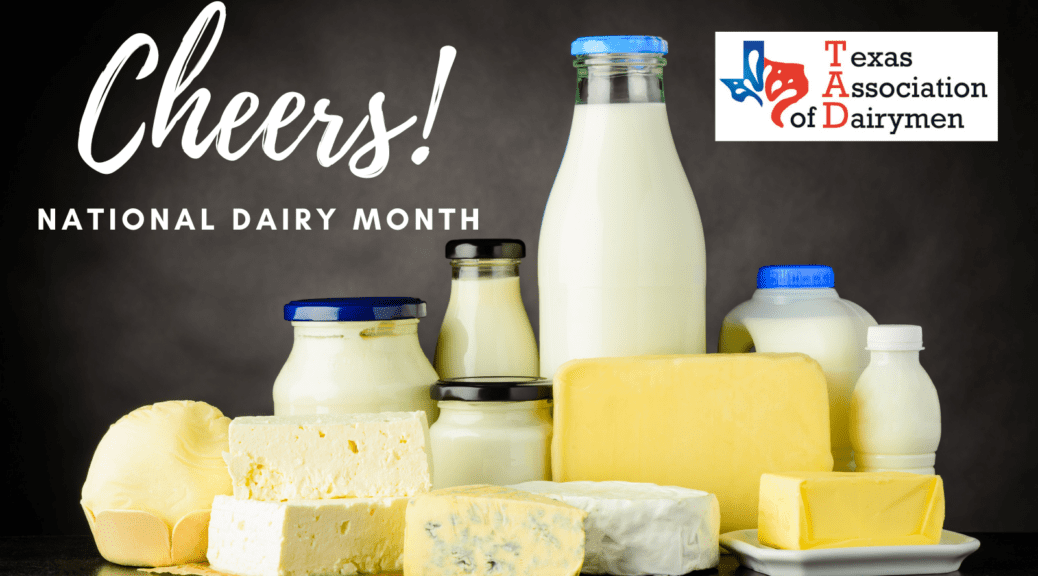
Return to June 2023 newsletter
National Dairy Month 2023: Every Texan can – and should – enjoy the abundance of dairy
By Darren Turley
Executive Director, Texas Association of Dairymen
If every Texan raised a glass of milk to toast National Dairy Month, they’d all be able to do so with milk produced by dairy farmers and cows in the Lone Star State – and still have some milk left over. That’s mind-boggling to me as both a fourth-generation Texan and a second-generation dairy farmer.
Last year, Texas dairies produced 1.9 million gallons, or 30.4 million glasses, of milk, while the state’s population broke the 30 million mark in March. Both amazing statistics are worth celebrating.
And neither the growth of the state’s milk production or population show any signs of slowing.
Here’s an example of how both intersect: Cacique Foods in May celebrated the opening of an $88 million dairy processing plant in Amarillo and announced it was moving its headquarters from Southern California to Irving, Texas. Cacique is following numerous other companies that have relocated to Texas in recent years, bringing jobs and an economic boost to Amarillo, Irving and the state as a whole, as well as growing the dairy industry’s $50.3 billion impact on our state.
Just as important to the Texas dairy industry is that the new 200,000 square foot Cacique processing plant, which soon will fully operational, will give dairy producers in the region another outlet for its milk. The company’s CEO says the plant will take up to 40 milk tankers a day to make its cheeses and creams, which will end up in groceries across the nation.
That will be a tremendous help. Texas has doubled its milk production since 2008, largely due to enormous growth in the number and size of dairies in the Panhandle region starting in 2006. Since then, we’ve seen Southwest Cheese, Hilmar Cheese, Lone Star Milk Producers and Select Milk Producers open facilities to make cheese, powder milk, butter and other dairy items with Texas milk.
As these new facilities opened, milk production in Texas grew to meet the added processing capacity. Even the addition of Cacique won’t end the shortage of processing outlets to take the mounting volume of milk our dairy farmers produce. In fact, some predict that Texas could easily surpass Idaho to become the nation’s third largest milk-producing state in the next two years.
What will we do with even more milk, if we’re struggling to find outlets for what we produce now?
A number of new processing plants are planned or under construction, such as Leprino Foods Company’s 850,000-square-foot dairy foods manufacturing plant being built in Lubbock, will help Texas producers in the coming years.
More Texas milk also could end up overseas. By 2050, the world will have an estimated two billion more mouths to feed, with the largest growth expected in Asian and African countries that already struggle to feed their populations. U.S. dairy exports – which set new volume and value records in 2022 – are strong and are expected to grow.
If it sounds like I’m presenting “too much milk” as a problem – well, it’s a “problem” I’m happy to celebrate. I encourage all Texans to do their part during National Dairy Month, as well as the rest of the year, to draw down the state’s excess of milk by enjoying plenty of milk, ice cream, cheese or their other favorite dairy product.
Return to June 2023 newsletter
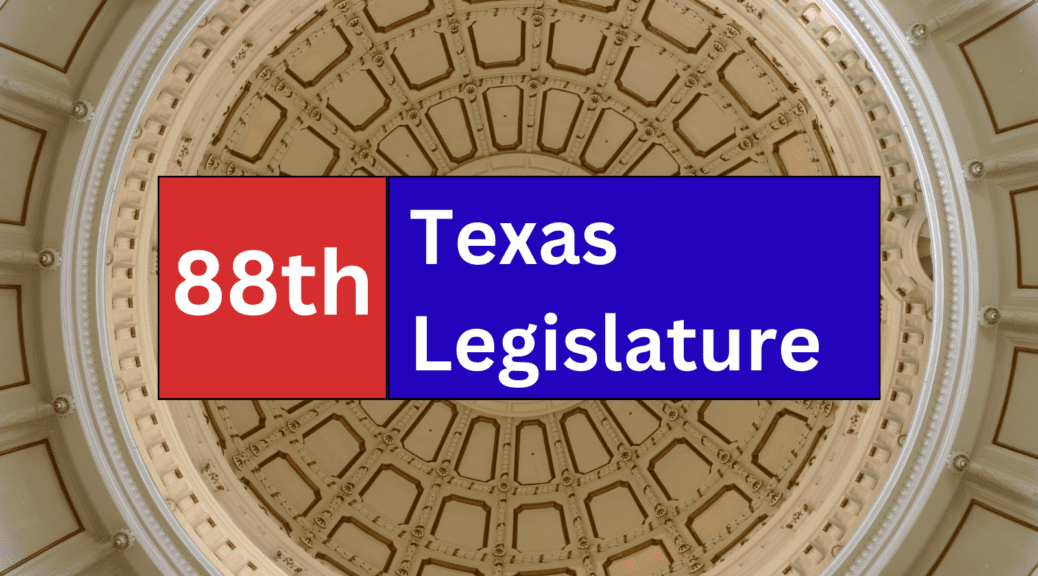
Note: Content below was posted and current as of May 16, 2023
Around the Texas Capitol
Sprint to the finale
By Lauren Fairbanks and J Pete Laney
TAD Governmental Affairs
Sine Die – the end of the legislative session – is on the horizon. Legislators adjourn their regular session on May 29, although Gov. Greg Abbott hints of a possible special session should some of his priorities not pass.
The advent of May marks the start of key bill passage deadlines kicking in:
- May 8: Last day for House committees to report out House Bills and House Joint Resolutions
- May 11: Last day for the House to consider bills on the floor on second reading
- Week of May 15: Final week for committee hearings
- May 24: Last calendar considered by the House and Senate
As of the midnight, May 11 House consideration deadline, more than 140 House bills were lost to the gears of the legislative calendar and political maneuvering. That number does not include the thousands that died in committee or were never placed on a calendar. Some measures can still find life as amendments to similar legislation. Others could have similar bills in the Senate that still have life. But the window for final passage is rapidly narrowing.
As of May 15, 194 bills have been sent to the governor – 40 House Bills and 154 Senate Bills. The Senate has passed 664 bills and the House has passed 1,500 bills. It remains to be seen how many more can make it through both chambers and onto the governor’s desk – a long way to go, with very little time to get there.
One measure that the dairy industry has supported this session has made it through the many hurdles of the legislative process and is on the governor’s desk. HB 692 by Rep. Glenn Rogers (R-Graford)/ Sen. Drew Springer (R-Muenster), relating to the authorization for certain land applications and disposal of dairy waste, would allow for the safe disposal of milk and milk by-products by land applications and proper disposal in retention facilities as long as those applications protect water quality. The bill provides specific directives to the Texas Commission on Environmental Quality (TCEQ) to adopt rules to prescribe conditions to authorize proper disposal of milk and milk by-products. It was sent to the governor on May 15.
Another priority measure of TAD, HB 2827 by Reps. DeWayne Burns (R-Cleburne)/Shelby Slawson (R-Stephenville))/David Spiller (R-Jacksboro)/Glenn Rogers (R-Graford), relating to the permitting of and performance of annual soil tests for certain concentrated animal feeding operations by the TCEQ, has a steep climb to final passage. The bill would streamline the permitting process for dairy permits in the North Bosque River Watershed while maintaining key water quality protections. After a contentious floor debate and surviving two points of order that were ultimately overruled, HB 2827 passed the House 80-53. It has been referred to the Senate Committee on Natural Resources and Economic Development.
With only two weeks of work left, compromise is needed on several big-ticket items. Leadership priorities that have not yet been passed include property tax relief, the state budget, electric grid reforms and school vouchers. The clock is ticking, and it remains to be seen what will ultimately pass.
Other legislation we are monitoring for the Texas dairy industry includes:
Right to Farm
SB 1421 by Sen. Charles Perry (R-Lubbock) relating to the effect of nuisance actions, other actions, and governmental requirements on certain agricultural operations – the Senate omnibus Right-to-Farm bill – passed the Senate on April 3. It was referred to the House Agriculture & Livestock committee on April 17. The House bills, HB 1750 by Rep. DeWayne Burns (R-Cleburne), HB 2308 by Rep. Trent Ashby (R-Lufkin) and HJR 126 also by Burns have cleared both chambers. HB 1750 has been passed by both the House and Senate and will be sent to the governor. HB 2308 has been sent to the governor. HJR 126 has passed both chambers and has been filed with the Secretary of State for a public vote on Nov. 7.
Water for Texas Fund Bills
SB 28/SJR 75 by Sen. Charles Perry (R-Lubbock) and HB 10/HJR 130 by Rep. Tracy King (D-Uvalde) create the Water for Texas Fund at the Texas Water Development Board (TWDB). The fund is intended to boost water infrastructure projects across the state and increase water supply for the future. The fund will use existing programs to disperse grants and loans to small and mid-sized entities seeking assistance with water infrastructure. Additionally, the bill directs the board members to use a portion of the fund for new water supply projects such as produced water, brackish, and marine desalination facilities; water from neighboring states; and new technologies to create water supply not currently accounted for in Texas. Perry said the new bill would use money from the state’s budget surplus. SB 28/SJR 75 passed the Senate and are up under consideration in the House.

Dairy bills in play at the Texas Capitol
By Darren Turley
TAD Executive Director
The 88th legislative session is very close to being over when you read this. The Texas Association of Dairymen (TAD) staff has worked so hard this session to pass two pieces of legislation of interest to the Texas dairy industry and get it to the governor’s desk, the final step to becoming law. With two weeks to go (as I’m writing this), one has made it there and one is still awaiting a hearing in a Texas Senate committee with time rapidly running out.
I have frequently told people that the process to prevent the passage of legislation that can impact dairy producers is a diligent effort. But the work to pass a bill – getting it through both chambers and then to the governor to become law – is just as difficult. The Texas legislative system is designed to kill more bills than are passed; out of 6,927 bills filed during the 2021 legislative session, for example, only 15% (1,073) passed.
TAD has a very knowledgeable staff that works with so many legislative offices to promote and answer questions about our bills and work toward favorable votes in both chambers. The relationships that have been developed over the last decade have been crucial in the positive movement of legislation this session.
You’ll find a full report on the latest from the Capitol in this governmental relations report in this newsletter. A wrap-up of the legislative session, which adjourns May 29, will be in the June edition of the Dairy Dispatch.
While TAD has been working in Austin this spring, rains have given most of the state a good start for a successful crop. After the horrible drought experienced last year, this is a true blessing. However, milk pricing is expected to be below break-even for most producers, and a great increase in pricing through the end of the year is not expected. The timing of this might be useful for the Farm Bill discussion that is underway in Washington. The current safety net programs are restrictive to the larger dairy producers in the western United. Hopefully the needed changes to current programs will be addressed in payment limits in the new Farm Bill.
The Federal Milk Marketing Order (FMMO) reform discussion between producers and processors is beginning to become streamlined, and proposals by both sides are closer together than I expected. These two sides need to come together to modernize the FMMO rules to propel the industry into the next decade. Processors have had a slight advantage in previous Farm Bills and in the FMMO regulations.
Finally, the most concerning issue for most farms and businesses across the state is the need for more labor. The report that 7 million working age males are not seeking employment in the current job market leaves the market very short of employees, even with the increased number of immigrants seeking to come to the United States.
Enjoy the last of spring because Texas usually switches very quickly to the hot summer temperatures. Have a great Memorial Day and remember the veterans who sacrificed all for our freedom.
Support HB 2827 – Reduce regulatory red tape while safeguarding water quality

Return to April 2023 Dairy Dispatch
Note: Information current on May 17, 2023
Around the Capitol:
The pace picks up – a sprint is ahead as bill deadlines loom
By Lauren Fairbanks and J Pete Laney
TAD Governmental Affairs
We are now a month and a half away from Sine Die – the end of the legislative session. The next key date legislators are keeping an eye on is May 8, the last day for House committees to report House Bills. As the legislative session rapidly rolls on, moving closer to that deadline, there will be marathon committee hearings before all the action turns to the House and Senate floors and behind closed doors for conference committees to hammer out the differences between the two versions of a bill.
Looking at the 93rd day for comparison purposes over the last three sessions, the Senate has been advancing bills through the chamber, outpacing previous sessions, while the House pages behind its usual pace.
|
|
Key pieces of legislation we are actively working on for the Texas dairy industry include:
Milk Disposal
HB 692 by Rep. Glenn Rogers (R-Graford)/SB 872 by Sen. Drew Springer (R-Muenster), relating to the authorization for certain land applications and disposal of dairy waste, are moving through the process. HB 692 has been voted out of committee and is recommended for the Local & Uncontested Calendar. The committee report has been filed with the committee coordinator and now awaits placement on the next Local Calendar. SB 872 was heard in the Senate Water, Agriculture & Rural Affairs Committee on April 13. It is currently pending in committee. You can find TAD’s legislative handout on these bills here.
Bosque Watershed CAFO Permitting
HB 2827 by Rep. DeWayne Burns (R-Cleburne), relating to the permitting of and performance of annual soil tests for certain concentrated animal feeding operations by the Texas Commission on Environmental Quality, was heard in the House Environmental Regulation Committee on April 13, and was voted out of committee 6-0 on April 18. This bill would remove the individual permit requirement in the Bosque Watershed and allow dairy farmers in the region to operate under the general permit used by dairies throughout Texas, while keeping stringent, best management practices in place. You can find TAD’s legislative handout on this bill here.
Right to Farm
SB 1421 by Sen. Charles Perry (R-Lubbock), relating to the effect of nuisance actions, other actions, and governmental requirements on certain agricultural operations, also known as the Senate omnibus right-to-farm bill, passed out of the Senate on April 3. It was referred to the House Agriculture & Livestock committee on April 17. The House bills, HB 1750 by Rep. DeWayne Burns (R-Cleburne), HB 2308 by Rep. Trent Ashby (R-Lufkin) and HJR 126also by Burns have passed the House and were received by the Senate on April 11. We now wait to see which chamber’s version will ultimately be moved through the rest of the process.
Property Tax Relief Act Passed
HB 2 —backed by House Speaker Dade Phelan and carried by Rep. Morgan Meyer (R-Dallas) — passed the full House by a 140-9 vote on April 13.
The bill proposes putting $12 billion into Texas school districts so that they, in turn, can lower their property taxes on home and business owners. For the owner of a $350,000 home, the package would result in more than $1,000 in savings over two years.
This continues the months-long showdown with the Senate over their warring tax-cut packages. Republican leaders in the House and Senate have publicly clashed over the appraisal-cap proposal.
In addition to HB 2, Meyer has proposed constitutional amendment HJR 1, which would lower the limit on increases in appraised value to 5% a year- and expand it to all types of real property, including commercial buildings, second homes, farms and timberland.
The Senate’s proposal (SB 3, 4, 5, and SJR 3 passed on March 22), is to raise the state’s homestead exemption — the amount of a home’s value that can’t be taxed by school districts — from $40,000 to $70,000; give an additional $20,000 bump to seniors; and give tax credits to businesses. Their proposal was referred to the House Ways & Means committee on April 10th.
It remains to be seen if a compromise may be reached before Sine Die.
Different State Budget Plans Pass House and Senate
The House and Senate have each passed its spending plans for the next two-year state budget, with differences including how each addresses possible property tax reform. The real work will soon begin as a conference committee will have a several weeks to hammer out the differences in two plans that both chambers can accept. Passing a balanced budget is the only thing lawmakers are constitutionally required to do each legislative session.
On April 6, the House gave preliminary approval to HB 1 by Chairman Greg Bonnen (R-Friendswood), its version of a historic $302.6 billion state spending plan for the next two years. Of the 388 prefiled amendments, 71 floor amendments were adopted and it passed by a vote of 136 to 10.
The budget proposal lawmakers passed pushes funding to some of leaderships biggest priorities this session, including more than $17 billion for property tax cuts, $5 billion in new money for schools, $1.6 billion for school security measures and $3.5 billion for cost-of-living adjustments for retired teachers’ pensions.
The debate over the bill was one of the shortest floor debates on the budget in recent history, wrapping up before 10 p.m. Historically, the debate has lasted well past midnight. Throughout the day, lawmakers clashed over school voucher programs, state funding for abortion programs and programs that promote diversity, equity and inclusion.
The Texas Senate unanimously passed its $308 billion version of the biennial budget on April 17, with no amendments and after a one-hour discussion – a much different process than in the House. The bill includes major investments in property tax cuts, juvenile justice, mental health, higher education, state parks, historical sites, border security and pay raises for teachers and state employees. It also sets aside $16.5 billion for property tax cuts.
Return to April 2023 Dairy Dispatch